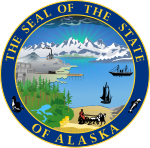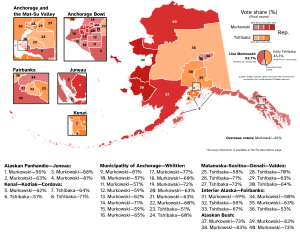| |||||||||||||||||||||
| |||||||||||||||||||||
Murkowski: 50–60% 60–70% 70–80% 80–90% Tshibaka: 50–60% 60–70% 70–80% | |||||||||||||||||||||
| |||||||||||||||||||||
| Elections in Alaska |
|---|
 |
The 2022 United States Senate election in Alaska was held on November 8, 2022. Incumbent senator Lisa Murkowski won reelection to a fourth full term, defeating fellow Republican Kelly Tshibaka and Democrat Patricia Chesbro.[1]
After the passage of Ballot Measure 2 in 2020, this was the first U.S. Senate election in Alaska to be held under a new election process. All candidates ran in a nonpartisan blanket top-four primary on August 16, 2022, and the top four candidates advanced to the general election, where voters utilized ranked-choice voting.[2][3]
Murkowski was appointed to the Senate in 2002 by her father, Frank Murkowski, who served as a U.S. senator from Alaska from 1981 until he was elected governor of Alaska. Murkowski had won three Senate elections since then, including a notable write-in campaign in the 2010 election, although she had never won an election with an outright majority of the vote.[4][5][6]
Murkowski had been a vocal critic of Donald Trump during his presidency and opposed several of his initiatives. Trump first stated in June 2020 that he planned to support a Republican challenger to Murkowski in 2022.[7] Murkowski was one of seven Republican senators who voted to convict Trump in his second impeachment trial in 2021, and was the only one up for re-election in 2022. On March 16, 2021, the Alaska Republican Party voted to censure Murkowski and announced that it would recruit a Republican challenger in the 2022 election cycle. Kelly Tshibaka, a former commissioner of the Alaska Department of Administration, was endorsed by Trump and the Alaska Republican Party.[8][9][10] Republican Senate leader Mitch McConnell and the National Republican Senatorial Committee supported Murkowski.[11]
In addition to Murkowski and Tshibaka, Democrat Pat Chesbro and Republican Buzz Kelley also advanced to the general election. On September 13, Kelley suspended his campaign and endorsed Tshibaka but remained on the ballot.[12] Murkowski received a plurality of first-place votes, but because no candidate received a majority of the votes in the first round, the instant runoff was triggered. Murkowski won reelection in the third and final round, winning most of the second-choice votes from Chesbro's voters.[13] Since Murkowski won her three previous elections to the U.S. Senate (2004, 2010, and 2016) without a majority of the vote, this election became the fourth election in which she did not receive a majority of the vote in the first round (the other three elections did not employ ranked choice voting with multiple rounds). Murkowski thus holds the record for the most number of elections won by a U.S. senator without winning a majority of the votes.
- ^ Gomez, Henry J. "Sen. Lisa Murkowski wins re-election in Alaska, fending off Trump-backed challenge after a ranked-choice runoff", NBC News (November 23, 2022).
- ^ Kitchenman, Andrew (November 18, 2020). "Alaska will have a new election system: Voters pass Ballot Measure 2". KTOO (FM). Archived from the original on November 18, 2020. Retrieved November 18, 2020.
- ^ "Alaska Division of Elections, Primary Election Info". Archived from the original on May 4, 2022. Retrieved December 10, 2021.
- ^ Bolstad, Erika (January 5, 2011). "After primary loss, write-in win, legal battle, Murkowski sworn in". McClatchy. Archived from the original on March 1, 2020.
- ^ Khan, Huma (November 16, 2010). "Lisa Murkowski Makes History, Wins Alaska Senate Race But Joe Miller Not Conceding". ABC News. Archived from the original on April 19, 2022. Retrieved September 24, 2021.
- ^ "Miller Concedes Loss to Murkowski". CBS News. December 31, 2010. Archived from the original on April 19, 2022. Retrieved September 24, 2021.
- ^ Desiderio, Andrew (June 4, 2020). "Trump vows to campaign against Murkowski after she backs Mattis". Politico. Archived from the original on April 19, 2022. Retrieved June 4, 2020.
- ^ Steinhauser, Paul (March 16, 2021). "Alaska GOP censures Murkowski, says it will recruit primary challenger". Fox News. Archived from the original on April 19, 2022. Retrieved March 17, 2021.
- ^ "Lisa Murkowski censured by Alaska Republicans for voting to convict Trump". The Guardian. Associated Press. March 16, 2021. Archived from the original on March 16, 2021. Retrieved March 17, 2021.
- ^ Acosta, Jim; Pellish, Aaron (March 6, 2021). "Trump says he'll campaign against Murkowski in Alaska next year". CNN. Archived from the original on March 6, 2021. Retrieved March 6, 2021.
- ^ "Alaska GOP votes to censure McConnell over his support for Murkowski". Washington Post. ISSN 0190-8286. Retrieved 2022-11-13.
- ^ "Alaska Senate candidate drops out of race". The Hill. September 13, 2022. Retrieved September 26, 2022.
- ^ Cochrane, Emily (2022-11-24). "Lisa Murkowski Wins Re-election in Alaska, Beating a Trump-Backed Rival". The New York Times. ISSN 0362-4331. Retrieved 2022-11-24.





